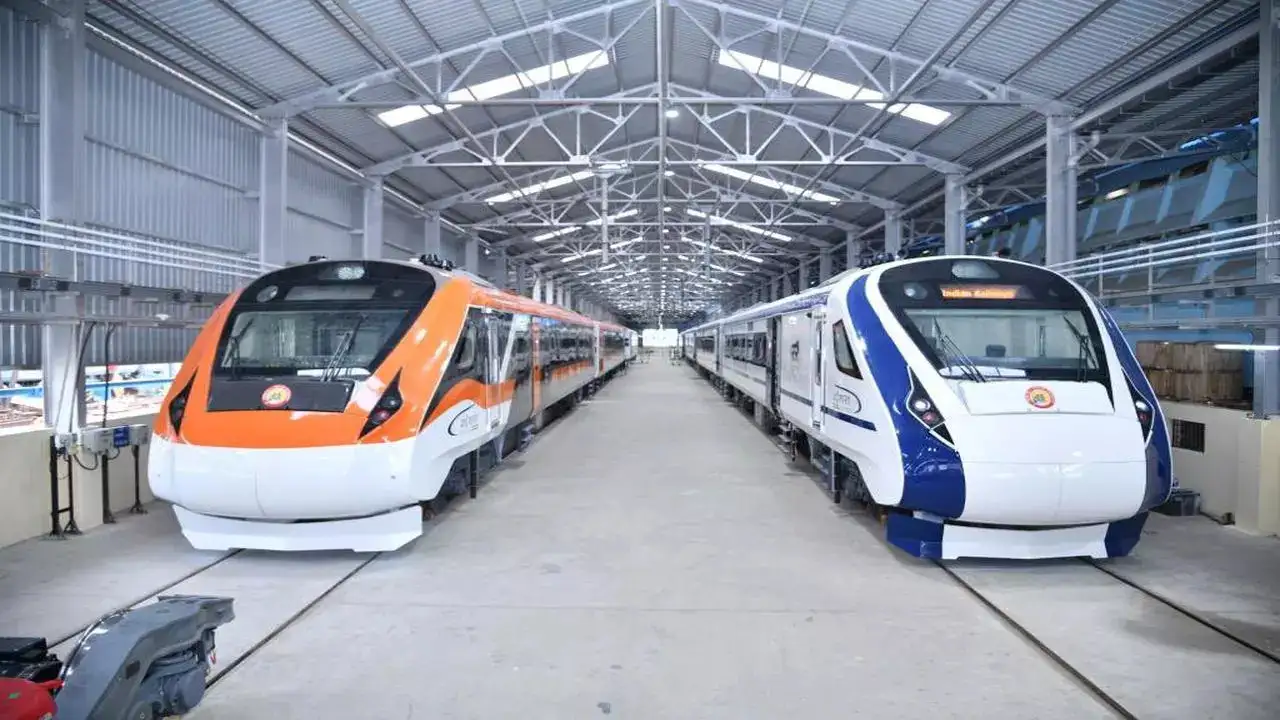Chennai’s Integral Coach Factory (ICF) has emerged as a key driver in this evolution. The production unit has been tasked with delivering nine new Vande Bharat trainsets in the financial year 2025–26, signalling a strong push to expand the country’s premium rail service and meet the growing demand for sustainable intercity travel.
A senior railway official confirmed the production target, stating that ICF will manufacture 11 Vande Bharat trainsets during the fiscal year, nine of which are designated as the Chair Car version. This marks a critical phase in the scaling up of India’s flagship semi-high-speed train programme, first introduced in 2019 to modernise long-distance rail travel with advanced amenities and faster commute times. The Vande Bharat Express, known for its aerodynamic design, improved acceleration, and onboard passenger comfort, has quickly gained popularity across multiple corridors, maintaining high occupancy levels since its inception. As demand surges, Indian Railways has adopted a two-pronged strategy—introducing new trainsets while simultaneously increasing coach capacities on existing routes.
Until the end of FY24, ICF was producing trainsets configured with either 8 or 16 coaches. However, in response to evolving route demands and capacity needs, the factory has diversified its production to include 20-coach trainsets. These larger configurations aim to cater to high-demand sectors and reduce waiting lists without compromising on speed or safety. The Vande Bharat trainsets are not only reshaping the passenger experience but are also pivotal to Indian Railways’ decarbonisation and modernisation goals. The Chair Car version, manufactured at ICF and other coach factories, is a fully indigenous development equipped with regenerative braking, automatic doors, GPS-enabled passenger information systems, and energy-efficient air conditioning systems—features aligned with the broader objective of reducing the carbon footprint of rail-based mobility.
Meanwhile, the Rail Coach Factory (RCF) in Kapurthala is also ramping up its production efforts. The Ministry of Railways has sanctioned the manufacture of 320 Vande Bharat 2.0 coaches at RCF, which will feature enhanced speed capabilities and improved energy performance. These coaches, designed for a maximum operating speed of 160 kmph and a top speed of 180 kmph, demonstrate India’s increasing capacity for engineering self-reliance in advanced transportation systems. The Vande Bharat 2.0 variant is engineered to reach 160 kmph in just 140 seconds—a 5-second improvement over the earlier version. This improved acceleration translates to faster intercity travel, less energy consumption per kilometre, and reduced congestion on high-traffic routes. These performance gains are seen as critical in a country where railways remain the backbone of mass mobility.
The production scaling is also expected to bring secondary benefits, including job creation, skill development, and growth in local supply chains that support manufacturing and maintenance. Experts suggest that these new-generation trains are not only an upgrade in passenger convenience but a symbol of India’s move toward sustainable, inclusive, and tech-enabled infrastructure. However, the ambitious rollout is not without challenges. Experts highlight that track modernisation, signalling upgrades, and terminal capacity enhancements must keep pace with the introduction of high-speed trains to ensure safety and efficiency. There is also a pressing need to ensure that the entire ecosystem—right from maintenance depots to crew training facilities—is robust and ready to handle these sophisticated rolling stocks.
With climate change shaping mobility priorities, Indian Railways’ focus on Vande Bharat trains aligns well with broader policy shifts toward cleaner, greener transport systems. As the country aspires for net-zero emissions by 2070, investments in electric, efficient, and high-capacity trains form a crucial part of the strategy to decarbonise long-haul and intercity travel. Chennai’s ICF, already a cornerstone in India’s rail production landscape, is playing a pivotal role in this transformation. Its enhanced output will support Indian Railways’ plan to connect more tier-2 and tier-3 cities with fast, reliable service that also addresses environmental concerns. Moreover, with each successful rollout, the Vande Bharat brand is being reinforced not just as a train but as a benchmark of what India’s rail future looks like—homegrown, sustainable, and passenger-first.
While the road ahead includes infrastructure harmonisation and capacity planning, the direction is clear: Indian Railways is building momentum toward a faster, cleaner, and more equitable transport future. Chennai’s role in that journey is only set to grow stronger in the coming years.
Also Read : Cabinet Approves Rail Capacity Boost in Maharashtra and Madhya Pradesh


